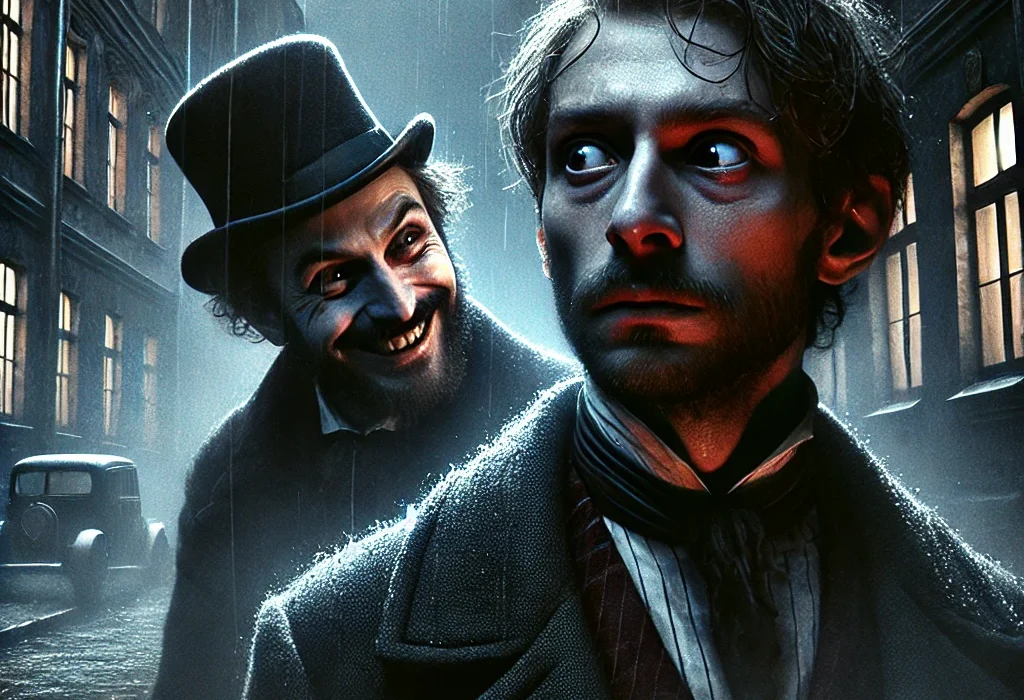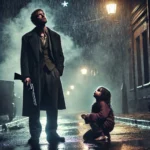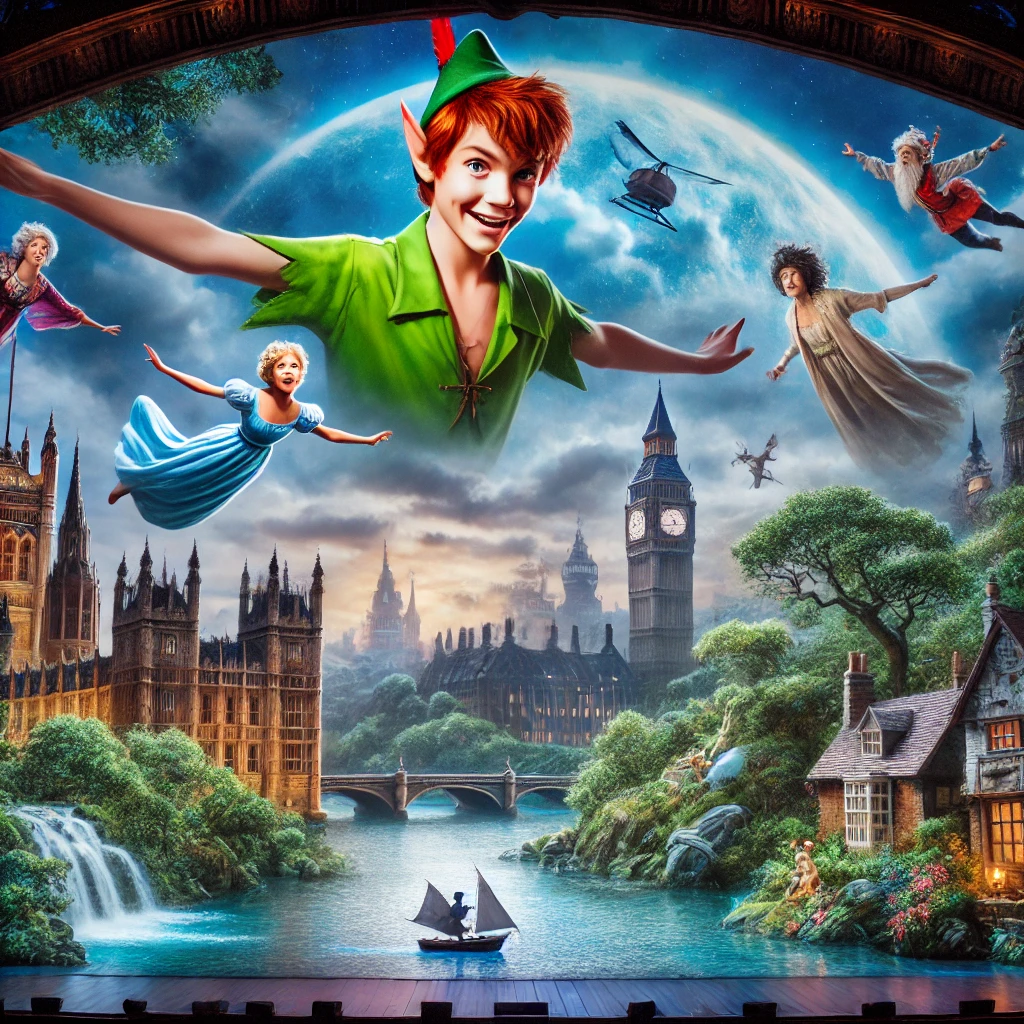“The Double” is a novella by Fyodor Dostoevsky, first published in 1846. It explores themes of identity, isolation, and mental disintegration. The protagonist, Yakov Petrovich Golyadkin, a low-ranking government clerk in Saint Petersburg, finds his life upended when he encounters his doppelgänger, a man who looks exactly like him but behaves in ways that undermine Golyadkin’s position in both his professional and personal life. The novella delves deep into the psychological breakdown of the protagonist and uses this to explore existential themes.
Plot Summary
Yakov Petrovich Golyadkin, a titular councillor, awakens one dreary morning in his modest apartment in Saint Petersburg, uncertain if he is still caught in the remnants of his dreams or if he is truly awake. His small, shabby room, with its grimy green walls, feels confining as the dull autumn light seeps through the window. Golyadkin is an anxious man, burdened by self-doubt and plagued by feelings of inadequacy. He checks himself in the mirror, worried that something might be amiss—perhaps a blemish or flaw that would mar his appearance—but finding nothing wrong, he dresses meticulously. Today, he has an important mission: he is to attend a grand dinner party hosted by his superior, Olsufy Ivanovich, where he hopes to impress.
The day begins in a whirl of nervous energy. Golyadkin, determined to make an impression, hires a carriage, puts on his best clothes, and sets off through the busy streets. As the carriage rattles along Nevsky Prospect, he anxiously scans the faces of passersby, hyperaware of being seen. At one point, he spots two colleagues from his department and quickly ducks to avoid being recognized, embarrassed by the grandiosity of his hired carriage. His mind spins with worry, as he feels increasingly out of place in this world of appearances and hierarchy.
Before the dinner, Golyadkin makes an unplanned visit to Krestyan Ivanovich, a doctor he had recently consulted. Though Krestyan Ivanovich had suggested a change in lifestyle—more socializing, more cheerfulness—Golyadkin feels that no one, not even the doctor, truly understands him. During this visit, Golyadkin is awkward, uncertain of why he has come. His words stumble over themselves, and he tries to convince both the doctor and himself that everything is fine. But Krestyan Ivanovich sees through him, sensing the man’s inner turmoil. Golyadkin, unable to articulate his growing unease, leaves abruptly, more disoriented than before.
Despite his nerves, Golyadkin makes his way to Olsufy Ivanovich’s dinner party. But when he arrives, he is greeted with a shock—he is refused entry. The servants turn him away politely but firmly, and Golyadkin is left humiliated. He stands at the door, trying to argue his way in, insisting that he has been invited, but the butler only repeats the message: “They cannot see you.” Defeated and flushed with shame, Golyadkin retreats, overwhelmed by a mixture of confusion, anger, and despair.
As Golyadkin wanders the streets in a daze, something even more unsettling happens. He encounters a man—a man who looks exactly like him. This stranger is not just similar in appearance; he is identical in every way, down to the smallest detail. At first, Golyadkin thinks he is hallucinating, his mind unable to comprehend what he is seeing. But the double, Golyadkin Junior, is real. He is not only real but, disturbingly, confident and charismatic—everything Golyadkin is not.
Golyadkin Junior quickly insinuates himself into Golyadkin’s life. At work, the double charms their colleagues, and even Olsufy Ivanovich, who had previously treated Golyadkin with disdain, seems to take a liking to this more assertive version of him. Golyadkin, already fragile, watches in horror as his double begins to replace him in every aspect of his life. Golyadkin Junior mirrors his actions but does them better, more confidently, and with a sinister smile. As the days pass, Golyadkin becomes increasingly paranoid, convinced that his double is plotting to ruin him.
Desperate to regain control, Golyadkin confronts his double on multiple occasions. Yet, each time, Golyadkin Junior only smiles and evades his questions, dismissing Golyadkin’s concerns as delusions. The double begins to mock Golyadkin, taunting him with his failures and social inadequacies. Golyadkin, who had always been timid and anxious, finds himself unraveling. He becomes obsessed with the idea that his double has been sent to destroy him. Every gesture, every word from Golyadkin Junior feels like a calculated attack, and Golyadkin’s fragile sense of self begins to crumble.
In a final act of desperation, Golyadkin tries to expose his double to the world. He believes that if others could see the two of them together, they would understand the cruel trick being played on him. He attempts to speak to his colleagues, to Olsufy Ivanovich, and even to Krestyan Ivanovich, but no one takes him seriously. To them, Golyadkin is simply acting irrationally, his behavior becoming more erratic with each passing day. His claims of a double are dismissed as the ravings of a madman.
In the end, Golyadkin is completely undone. His identity, already fragile, disintegrates under the weight of his delusions. The line between reality and madness blurs irrevocably. One evening, he is found wandering the streets, muttering incoherently about enemies and conspiracies. Krestyan Ivanovich, upon hearing of his condition, arranges for him to be taken away, and Golyadkin, exhausted and broken, is led to a carriage. As the door closes behind him, the double is nowhere to be seen, but Golyadkin’s mind is haunted by the shadow of his other self—a self that was, perhaps, not real in the first place, or worse, a part of him all along.
As the carriage drives off into the night, the world outside continues as if nothing had happened, while Golyadkin’s fragile sense of reality shatters completely, leaving him in the darkness of his own making.
Main Characters
Yakov Petrovich Golyadkin: The main character, a titular councillor who works as a civil servant. Golyadkin is socially awkward, insecure, and often anxious. His life spirals into chaos when his double appears, embodying everything that Golyadkin wishes he could be: confident, assertive, and socially adept. Golyadkin’s encounter with his double becomes the catalyst for his psychological disintegration.
Golyadkin Junior (The Double): Golyadkin’s doppelgänger, who not only looks identical to him but seems to embody the opposite of his character. Golyadkin Junior is manipulative, charming, and gradually takes over Golyadkin’s life. His existence throws Golyadkin into an existential crisis, blurring the lines between reality and delusion.
Petrushka: Golyadkin’s servant, who represents the disdain and indifference that others often show Golyadkin. His dismissive attitude towards his master reflects Golyadkin’s own sense of insecurity and social inferiority.
Krestyan Ivanovich: Golyadkin’s doctor, who tries to provide some rational guidance to Golyadkin but ultimately represents the authority figures who misunderstand or dismiss Golyadkin’s psychological suffering.
Theme
Duality and Identity: The central theme of the novella is the concept of the double or doppelgänger, symbolizing the divided self. Golyadkin’s encounter with his double raises questions about identity and self-perception. The double represents the darker, suppressed aspects of Golyadkin’s personality, suggesting that he cannot integrate these parts of himself, leading to his breakdown.
Madness and Paranoia: As Golyadkin becomes more fixated on the actions of his double, his grip on reality weakens. The narrative conveys his descent into madness, portraying his growing paranoia as he loses control over his life. Dostoyevsky explores how isolation and internal conflict can lead to mental collapse.
Social Hierarchy and Alienation: Golyadkin is acutely aware of his lower social status and this awareness feeds his insecurities. His encounters with colleagues and superiors highlight the rigid social structure in 19th-century Russia, where one’s worth is often tied to rank and reputation. Golyadkin’s double represents his failure to navigate this social system successfully.
Existential Despair: The novella touches on existential themes, particularly the idea of existential isolation. Golyadkin’s crisis reflects a broader philosophical anxiety about the nature of existence, the self, and the fear of being insignificant or erased from the world.
Writing Style and Tone
Dostoevsky’s writing in The Double is marked by its psychological depth and complexity. He uses a third-person limited omniscient narrator to closely track Golyadkin’s thoughts and emotions, creating a sense of claustrophobia as the protagonist’s mental state deteriorates. The narrative often mirrors Golyadkin’s paranoia and confusion, with long, spiraling sentences that reflect his frantic internal monologues. Dostoevsky’s use of dark humor is subtle but significant, offering a critique of society while also allowing readers to sympathize with Golyadkin’s plight.
The tone of the novella is one of anxiety and uncertainty. From the opening scenes, where Golyadkin awakens unsure of whether he is dreaming or awake, the story maintains an atmosphere of unease. The absurdity of Golyadkin’s interactions with his double contributes to the surreal, almost Kafkaesque quality of the narrative, which keeps readers questioning what is real and what is imagined.
We hope this summary has sparked your interest and would appreciate you following Celsius 233 on social media:
There’s a treasure trove of other fascinating book summaries waiting for you. Check out our collection of stories that inspire, thrill, and provoke thought, just like this one by checking out the Book Shelf or the Library
Remember, while our summaries capture the essence, they can never replace the full experience of reading the book. If this summary intrigued you, consider diving into the complete story – buy the book and immerse yourself in the author’s original work.
If you want to request a book summary, click here.
When Saurabh is not working/watching football/reading books/traveling, you can reach him via Twitter/X, LinkedIn, or Threads
Restart reading!








